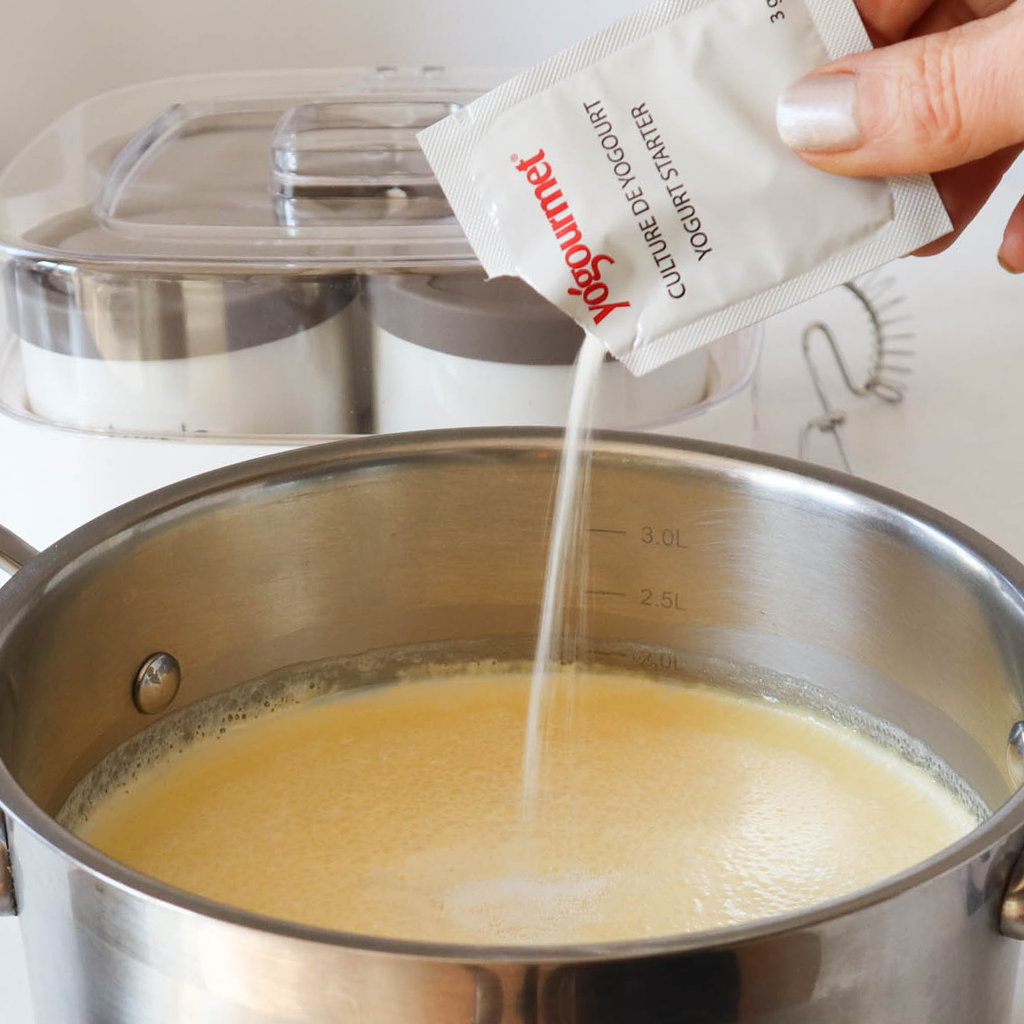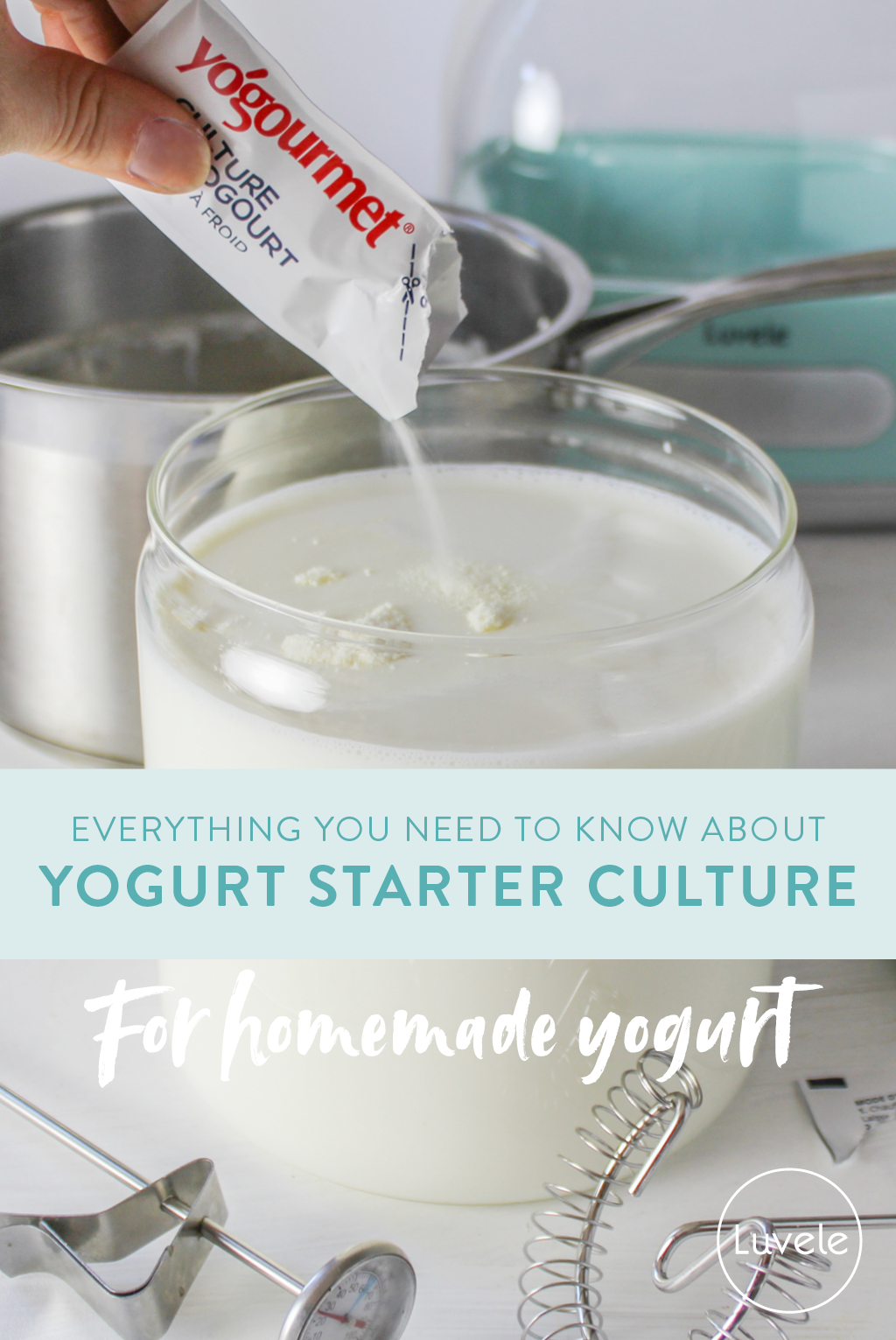Your Cart is Empty

Everything you need to know about yoghurt starter culture
Barb Hodgens
Barb Hodgens loves to cook with alternative, healthy whole food ingredients, with a focus on gut health. Barb has overcome her own gut health issues through healthy eating. Share your ideas, comments and photos at the end of this post :)

YOGURT STARTER CULTURE AND PROBIOTIC POWDER.
A traditional yogurt starter is a carefully balanced blend of bacteria which consume the lactose in animal milk. These bacteria convert lactose to lactic acid, which changes the protein structure of milk. The end result will have a tangy taste, a thicker and creamier texture, and will stay consumable longer than milk itself.
There are different ways to add bacteria culture. You can use a portion of pre-made yogurt, a specific blend of dried bacteria (yogurt starter culture), or a probiotic powder.
TRADITIONAL DAIRY YOGURT FERMENTATION
Traditional dairy yogurt is produced using a blend of bacteria cultures made up of Lactobacillus delbrueckii subsp. Lactobacillus bulgaricus and Streptococcus thermophilus bacteria. Lactobacillus subsp. Casei, Lactobacillus acidophilus and Bifidobacteria may also be added. More recently manufacturers may combine other strains of probiotic bacteria which are known to have gastrointestinal and immune system health benefits.

Yogurt starter cultures are carefully balanced so that the strains work together, but different combinations of these bacteria produce different types of yogurt. A country or region is often known for a specific blend. Depending on the fermentation and time the characteristic tangy flavor of homemade yogurt can range from mildly sour to very tart, plus the texture can vary from drinkable to thick set.
There are other factors also - The type and quality of animal milk you use also impacts the texture. Goat milk yogurt and raw milk yogurt will be runnier than pasteurised cow milk yogurt. Yogurt starter culture can also be used to ferment cream.

NON-DAIRY MILK YOGURT FERMENTATION
In dairy-based yogurt the bacteria in a starter culture feed on the milk’s natural sugar, (lactose) during fermentation. Plant-based milk doesn’t have as much natural sugar available to feed the bacteria and ensure the culturing process will take place or continue for the full duration of the fermentation.
One teaspoon of white sugar or one tablespoon of pasteurised honey is enough to kick start fermentation and proliferate the bacteria strains. Raw honey may have an antibiotic effect and is therefore not suitable for making yogurt. Remember it’s not for you, it is for the bacteria!
There are no specific strains of bacteria required for making non-dairy yogurt. Any combination of sugar loving bacteria, from either a yogurt starter culture or a probiotic capsule or powder will repopulate if the conditions are right. The only 3 things they need are food (a little bit of sugar), warmth and time.

YOGURT AS A STARTER CULTURE
Using a quantity of existing yogurt is a common way to inoculate milk for a new batch of yogurt. When purchasing commercial yogurt look at the ingredients list and make sure it contains live cultures and does not contain any flavours or additives. Plain Greek yogurt is the best choice.
Furthermore, homemade yogurt can also be used as a starter for another batch. Simply whisk a quarter cup (per 1 litre of milk) into your milk. Over time the probiotic strains will weaken so this is not a process to be repeated indefinitely.
Commercial, non-dairy yogurt will contain stabilisers and gelling agents that may interfere with the yogurt culturing process. It is advisable to always use a starter culture or probiotic with non-dairy milk.
PROBIOTIC POWDER AS A STARTER CULTURE
The bacteria in a commercial probiotic pill or powder will multiply in yogurt, however if you are making dairy milk yogurt not all probiotic bacteria will result in true yogurt. Our L Reuteri probiotic yogurt which is best described as a fermented dairy, is a good example of this. To be considered true 'yogurt, rather than fermented dairy, the probiotic must predominately contain; Lactobacillus bulgaricus, Streprococcus thermophilus, Bifidobacterium lactis or Lactobacillus acidophilus.
It is best to use a premium, multi-strain probiotic that requires refrigeration. Speak to your Naturopath or Pharmacist for a good quality, practitioner brand. Probiotics may come as a powder or capsule. To use as a yogurt starter culture, simply add the required dose or open the capsule and pour the contents into your milk. One dose or capsule is enough for 4 cups of milk.
Disclaimer: There are many probiotics on the market. We cannot guarantee they will all reliably make yogurt in dairy milk. From our experience, and the feedback we receive from customers, multi-strain probiotics are better suited to plant-based yogurt making. If you have experimented with a brand of probiotics that makes great yogurt in cows’ milk, message us, we would love to hear from you.
If you are looking to make probiotic yogurt the following methods receive impressive testimonials.
Progood probiotic homemade yogurt
Cutting edge cultures probiotic yogurt
L Reuteri probiotic yogurt
L Reuteri superfood yogurt
How to make yogurt with Lactobacilli Gasseri
SIBO yogurt
SCD YOGURT STARTER CULTURE
The original Specific Carbohydrate Diet (SCD), from the book ‘Breaking the Vicious Cycle’, calls for a yogurt starter that does not contain Bifidus/Bifidum bacteria because it can ‘take over’ and cause health problems in some cases. While on the early stages of the diet it is best to avoid anything that has 'bifid' in its name. e.g. Bifidobacterium infantis, Bifidobacterium bifidum, Lactobacillus Bifidus, Bifidobacterium longum etc. Here is a list of recommended GAPS & SCD starter cultures.
BACTERIA ARE HEAT SENSITIVE
Always add your yogurt starter culture to the milk when it is below 108° F (42° C). Temperatures above 43° C will kill bacteria. This step by step recipe will explain further and take the worry out of making yogurt at home.
PIN THIS INFORMATION

BUY YOUR STARTER CULTURE HERE


Everything you need to know about yoghurt starter culture

YOGURT STARTER CULTURE AND PROBIOTIC POWDER.
A traditional yogurt starter is a carefully balanced blend of bacteria which consume the lactose in animal milk. These bacteria convert lactose to lactic acid, which changes the protein structure of milk. The end result will have a tangy taste, a thicker and creamier texture, and will stay consumable longer than milk itself.
There are different ways to add bacteria culture. You can use a portion of pre-made yogurt, a specific blend of dried bacteria (yogurt starter culture), or a probiotic powder.
TRADITIONAL DAIRY YOGURT FERMENTATION
Traditional dairy yogurt is produced using a blend of bacteria cultures made up of Lactobacillus delbrueckii subsp. Lactobacillus bulgaricus and Streptococcus thermophilus bacteria. Lactobacillus subsp. Casei, Lactobacillus acidophilus and Bifidobacteria may also be added. More recently manufacturers may combine other strains of probiotic bacteria which are known to have gastrointestinal and immune system health benefits.

Yogurt starter cultures are carefully balanced so that the strains work together, but different combinations of these bacteria produce different types of yogurt. A country or region is often known for a specific blend. Depending on the fermentation and time the characteristic tangy flavor of homemade yogurt can range from mildly sour to very tart, plus the texture can vary from drinkable to thick set.
There are other factors also - The type and quality of animal milk you use also impacts the texture. Goat milk yogurt and raw milk yogurt will be runnier than pasteurised cow milk yogurt. Yogurt starter culture can also be used to ferment cream.

NON-DAIRY MILK YOGURT FERMENTATION
In dairy-based yogurt the bacteria in a starter culture feed on the milk’s natural sugar, (lactose) during fermentation. Plant-based milk doesn’t have as much natural sugar available to feed the bacteria and ensure the culturing process will take place or continue for the full duration of the fermentation.
One teaspoon of white sugar or one tablespoon of pasteurised honey is enough to kick start fermentation and proliferate the bacteria strains. Raw honey may have an antibiotic effect and is therefore not suitable for making yogurt. Remember it’s not for you, it is for the bacteria!
There are no specific strains of bacteria required for making non-dairy yogurt. Any combination of sugar loving bacteria, from either a yogurt starter culture or a probiotic capsule or powder will repopulate if the conditions are right. The only 3 things they need are food (a little bit of sugar), warmth and time.

YOGURT AS A STARTER CULTURE
Using a quantity of existing yogurt is a common way to inoculate milk for a new batch of yogurt. When purchasing commercial yogurt look at the ingredients list and make sure it contains live cultures and does not contain any flavours or additives. Plain Greek yogurt is the best choice.
Furthermore, homemade yogurt can also be used as a starter for another batch. Simply whisk a quarter cup (per 1 litre of milk) into your milk. Over time the probiotic strains will weaken so this is not a process to be repeated indefinitely.
Commercial, non-dairy yogurt will contain stabilisers and gelling agents that may interfere with the yogurt culturing process. It is advisable to always use a starter culture or probiotic with non-dairy milk.
PROBIOTIC POWDER AS A STARTER CULTURE
The bacteria in a commercial probiotic pill or powder will multiply in yogurt, however if you are making dairy milk yogurt not all probiotic bacteria will result in true yogurt. Our L Reuteri probiotic yogurt which is best described as a fermented dairy, is a good example of this. To be considered true 'yogurt, rather than fermented dairy, the probiotic must predominately contain; Lactobacillus bulgaricus, Streprococcus thermophilus, Bifidobacterium lactis or Lactobacillus acidophilus.
It is best to use a premium, multi-strain probiotic that requires refrigeration. Speak to your Naturopath or Pharmacist for a good quality, practitioner brand. Probiotics may come as a powder or capsule. To use as a yogurt starter culture, simply add the required dose or open the capsule and pour the contents into your milk. One dose or capsule is enough for 4 cups of milk.
Disclaimer: There are many probiotics on the market. We cannot guarantee they will all reliably make yogurt in dairy milk. From our experience, and the feedback we receive from customers, multi-strain probiotics are better suited to plant-based yogurt making. If you have experimented with a brand of probiotics that makes great yogurt in cows’ milk, message us, we would love to hear from you.
If you are looking to make probiotic yogurt the following methods receive impressive testimonials.
Progood probiotic homemade yogurt
Cutting edge cultures probiotic yogurt
L Reuteri probiotic yogurt
L Reuteri superfood yogurt
How to make yogurt with Lactobacilli Gasseri
SIBO yogurt
SCD YOGURT STARTER CULTURE
The original Specific Carbohydrate Diet (SCD), from the book ‘Breaking the Vicious Cycle’, calls for a yogurt starter that does not contain Bifidus/Bifidum bacteria because it can ‘take over’ and cause health problems in some cases. While on the early stages of the diet it is best to avoid anything that has 'bifid' in its name. e.g. Bifidobacterium infantis, Bifidobacterium bifidum, Lactobacillus Bifidus, Bifidobacterium longum etc. Here is a list of recommended GAPS & SCD starter cultures.
BACTERIA ARE HEAT SENSITIVE
Always add your yogurt starter culture to the milk when it is below 108° F (42° C). Temperatures above 43° C will kill bacteria. This step by step recipe will explain further and take the worry out of making yogurt at home.
PIN THIS INFORMATION

BUY YOUR STARTER CULTURE HERE


Subscribe
Sign up to get the latest on sales, new releases and more …
Item is added to cart


